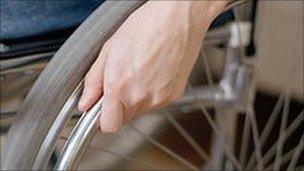Benefit applicants - '75% fit to work or drop claims'
- Published
- comments

The government wants to reduce the number of long-term claimants of incapacity benefit
Three-quarters of people who apply for sickness benefit were found fit to work or drop their claims before they are completed, the government says.
Figures show 887,300 of 1,175,700 people applying for employment and support allowance (ESA) between October 2008 and August 2010 failed to qualify.
Fitness to work tests are being changed following criticism from mental health groups and an independent review.
About 40% of applicants' appeals against rulings have been successful.
'Clear evidence'
People claiming ESA - which replaced incapacity benefit - for the first time now have to go through a face-to-face test, the Work Capability Assessment, which was introduced under the previous Labour government.
The test is also in the process of being rolled out to 2.6 million people who were already claiming disability benefits.
Department for Work and Pensions figures for people applying for ESA between 27 October 2008 and 31 August 2010 show that of the 887,300 people who failed to qualify for assistance, 39% were judged fit to work, while 36% abandoned their claim - for example because their illness was short term.
Only 6% of claims - 73,500 people - were considered to be entitled to full ESA support.
Employment minister Chris Grayling said the figures showed how important it was to reassess people who were still on the old incapacity benefit.
"We now know very clearly that the vast majority of new claimants for sickness benefits are in fact able to return to work.
"That's why we are turning our attention to existing claimants, who were simply abandoned on benefits.
"That's why we are reassessing all of those claimants, and launching the work programme to provide specialist back to work support," he said.
He said those who could not work would get "unconditional support" but for other it was "right and proper that they start back on the road to employment".
The Work Capability Assessment involves a "functional health assessment" of someone's ability to work, rather than the previous "diagnostic medical assessment" by a GP or specialist, focusing on particular conditions.
It determines whether applicants are entitled to the highest rate of ESA - for those deemed unable to work due to sickness or disability, or are considered "fit for work" - in which case they are put on Jobseeker's Allowance instead.
It can also place applicants into a "work related activity group", where they will be expected to take steps to prepare themselves for work.
But the assessment has proved controversial and its rulings have prompted tens of thousands of appeals. An independent report found that the numbers of rulings overturned on appeal since the test was introduced had been "consistently around 40%".
The test was changed after criticism from mental health campaigners and an independent review of the system in November 2010.
The Harrington review recommended mental health experts be present in all assessment centres to ensure full understanding of individual conditions, more support for those being assessed and better communication of what the test entails.
The government accepted all the recommendations and says they will be implemented by the summer.
But mental health charity Mind has said it fears the assessments are still "unfit for purpose and will have a detrimental impact on people with mental health problems".
- Published22 April 2011
- Published21 April 2011
- Published10 March 2011
- Published23 November 2010